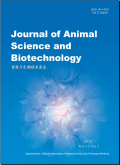首页|期刊导航|Journal of Animal Science and Biotechnology|Probiotic Pediococcus pentosaceus restored gossypol-induced intestinal barrier injury by increasing propionate content in Nile tilapia
Journal of Animal Science and Biotechnology2024,Vol.15Issue(4):P.1688-1703,16.DOI:10.1186/s40104-024-01011-w
Probiotic Pediococcus pentosaceus restored gossypol-induced intestinal barrier injury by increasing propionate content in Nile tilapia
摘要
关键词
Gut barrier injury/Gossypol/ISCs proliferation/Nlrc3/Propionate分类
农业科技引用本文复制引用
Feifei Ding,Nannan Zhou,Yuan Luo,Tong Wang,Weijie Li,Fang Qiao,Zhenyu Du,Meiling Zhang..Probiotic Pediococcus pentosaceus restored gossypol-induced intestinal barrier injury by increasing propionate content in Nile tilapia[J].Journal of Animal Science and Biotechnology,2024,15(4):P.1688-1703,16.基金项目
supported by the Provincial Science and Technology Innovative Program for Carbon Peak and Carbon neutrality of Jiangsu of China (BE2022422) (BE2022422)
National Natural Science Foundation of China (32373145)。 (32373145)

